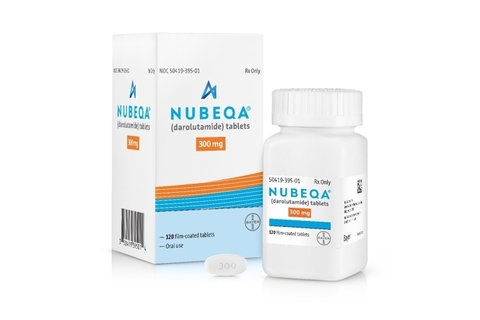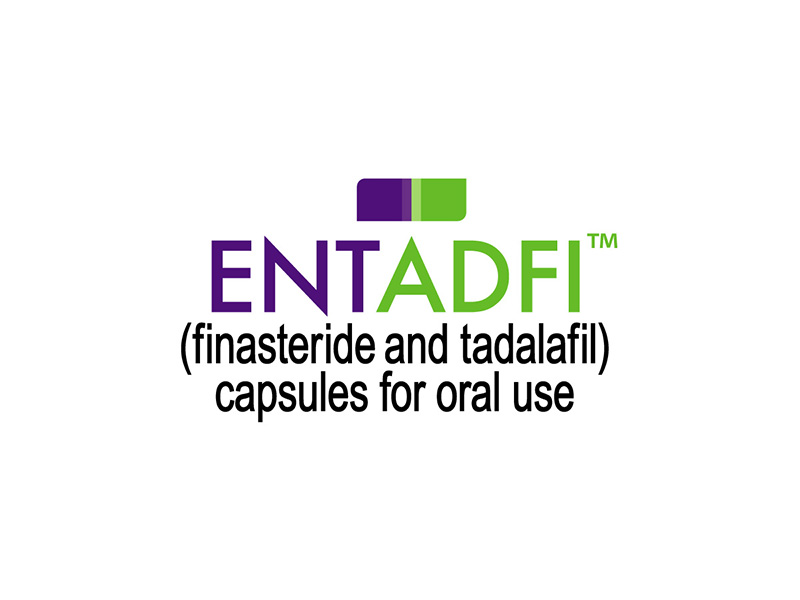Nubeqa (darolutamide) vs Entadfi (finasteride and tadalafil)
Nubeqa (darolutamide) vs Entadfi (finasteride and tadalafil)
Nubeqa (darolutamide) is an androgen receptor inhibitor specifically approved for the treatment of non-metastatic castration-resistant prostate cancer, focusing on blocking the effect of testosterone on the cancer cells. Entadfi combines finasteride, a 5-alpha-reductase inhibitor that reduces the size of the prostate gland, with tadalafil, a phosphodiesterase-5 inhibitor that helps relieve urinary symptoms and can also address erectile dysfunction. When deciding between these medications, it is important to consider the specific diagnosis and treatment goals, as Nubeqa is targeted for a specific type of prostate cancer, while Entadfi is used to manage symptoms associated with benign prostatic hyperplasia (BPH) and could be beneficial for patients with concurrent erectile dysfunction.
Difference between Nubeqa and Entadfi
| Metric | Nubeqa (darolutamide) | Entadfi (finasteride and tadalafil) |
|---|---|---|
| Generic name | Darolutamide | Finasteride and Tadalafil |
| Indications | Non-metastatic castration-resistant prostate cancer (nmCRPC) | Benign prostatic hyperplasia (BPH) |
| Mechanism of action | Androgen receptor inhibitor | Finasteride: 5-alpha-reductase inhibitor, Tadalafil: Phosphodiesterase type 5 inhibitor |
| Brand names | Nubeqa | Entadfi |
| Administrative route | Oral | Oral |
| Side effects | Fatigue, pain in extremity, rash | Finasteride: Sexual dysfunction, Tadalafil: Headache, dyspepsia, back pain |
| Contraindications | Pregnancy, severe hepatic impairment | Finasteride: Pregnancy, Tadalafil: Nitrates use, severe cardiovascular status |
| Drug class | Nonsteroidal antiandrogen | Finasteride: 5-alpha-reductase inhibitor, Tadalafil: PDE5 inhibitor |
| Manufacturer | Bayer | Veru Inc. |
Efficacy
Nubeqa (Darolutamide) Efficacy in Prostate Cancer
Nubeqa, with the active ingredient darolutamide, is a medication approved for the treatment of a specific type of prostate cancer known as non-metastatic castration-resistant prostate cancer (nmCRPC). This condition occurs when prostate cancer does not respond to treatment that lowers testosterone levels and has not yet spread to other parts of the body. Darolutamide works by blocking the action of androgens, such as testosterone, which can promote the growth of prostate cancer cells. Clinical trials have demonstrated that darolutamide can significantly extend the metastasis-free survival of patients with nmCRPC, meaning patients treated with this medication had a longer period before their cancer spread.
The efficacy of Nubeqa was primarily shown in a pivotal phase 3 trial known as the ARAMIS trial. In this study, patients receiving darolutamide experienced a median metastasis-free survival of 40.4 months, compared to 18.4 months for patients receiving a placebo. This substantial extension in metastasis-free survival highlights the effectiveness of Nubeqa in delaying the progression of nmCRPC. Furthermore, darolutamide has been associated with a favorable safety profile, with a lower incidence of severe side effects compared to other similar medications.
Entadfi (Finasteride and Tadalafil) Efficacy in Prostate Cancer
Entadfi, which combines finasteride and tadalafil, is not directly indicated for the treatment of prostate cancer. Instead, it is approved for the management of the signs and symptoms of benign prostatic hyperplasia (BPH). Finasteride is a 5-alpha-reductase inhibitor that reduces the size of the prostate gland by blocking the conversion of testosterone to dihydrotestosterone (DHT), a hormone that can cause prostate growth. Tadalafil, a phosphodiesterase type 5 (PDE5) inhibitor, helps relieve urinary symptoms by relaxing muscles in the prostate and bladder. While these medications can improve symptoms associated with an enlarged prostate, their efficacy in treating prostate cancer specifically has not been established.
It is important to note that finasteride, one of the components of Entadfi, has been studied in the context of prostate cancer prevention in the Prostate Cancer Prevention Trial (PCPT). The trial suggested that finasteride might reduce the risk of developing prostate cancer; however, there was also a concern that it might increase the likelihood of developing high-grade prostate cancer in a small percentage of men. The use of finasteride and tadalafil in combination, as in Entadfi, for prostate cancer prevention or treatment, has not been approved, and their efficacy for this specific purpose remains uncertain.
Regulatory Agency Approvals
Nubeqa
-
European Medical Agency (EMA), European Union

-
Food and Drug Administration (FDA), USA

Entadfi
-
Food and Drug Administration (FDA), USA

Access Nubeqa or Entadfi today
If Nubeqa or Entadfi are not approved or available in your country (e.g. due to supply issues), you can access them via Everyone.org.
How it works

Make an enquiry
Choose the medicine you want to buy, answer a couple of questions, and upload your prescription to speed things up. We’ll get back to you within 24 hours.


Make an enquiry
Choose the medicine you want to buy, answer a couple of questions, and upload your prescription to speed things up. We’ll get back to you within 24 hours.


Breeze through the paperwork
We'll guide you through the required documents for importing unapproved medicine, ensuring you have all the necessary information.


Get a personalized quote
We’ll prepare a quote for you, including medicine costs and any shipping, administrative, or import fees that may apply.


Receive your medicine
Accept the quote and we’ll handle the rest - sourcing and safely delivering your medicine.

Some text on this page has been automatically generated. Speak to your physician before you start a new treatment or medication.
Let's talk
If you have any questions, call us or send us a message through WhatsApp or email:
Contact us




